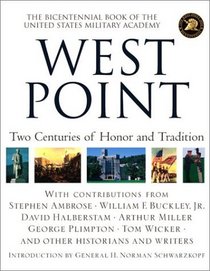Search -
West Point: Two Centuries of Honor and Tradition
West Point Two Centuries of Honor and Tradition
Author:
With contributions from Stephen Ambrose, William F. Buckley, Jr., David Halberstam, Arthur Miller, George Plimpton, Tom Wicker and other historians and writers — Introduction by General H. Norman Schwarzkopf — The year 2002 marks the bicentennial of the United States Military Academy at West Point. More than any other institution's, the history of... more »
Author:
With contributions from Stephen Ambrose, William F. Buckley, Jr., David Halberstam, Arthur Miller, George Plimpton, Tom Wicker and other historians and writers — Introduction by General H. Norman Schwarzkopf — The year 2002 marks the bicentennial of the United States Military Academy at West Point. More than any other institution's, the history of... more »
ISBN-13: 9780446530187
ISBN-10: 0446530182
Pages: 304
Rating: ?
ISBN-10: 0446530182
Pages: 304
Rating: ?
0 stars, based on 0 rating
Genres:




